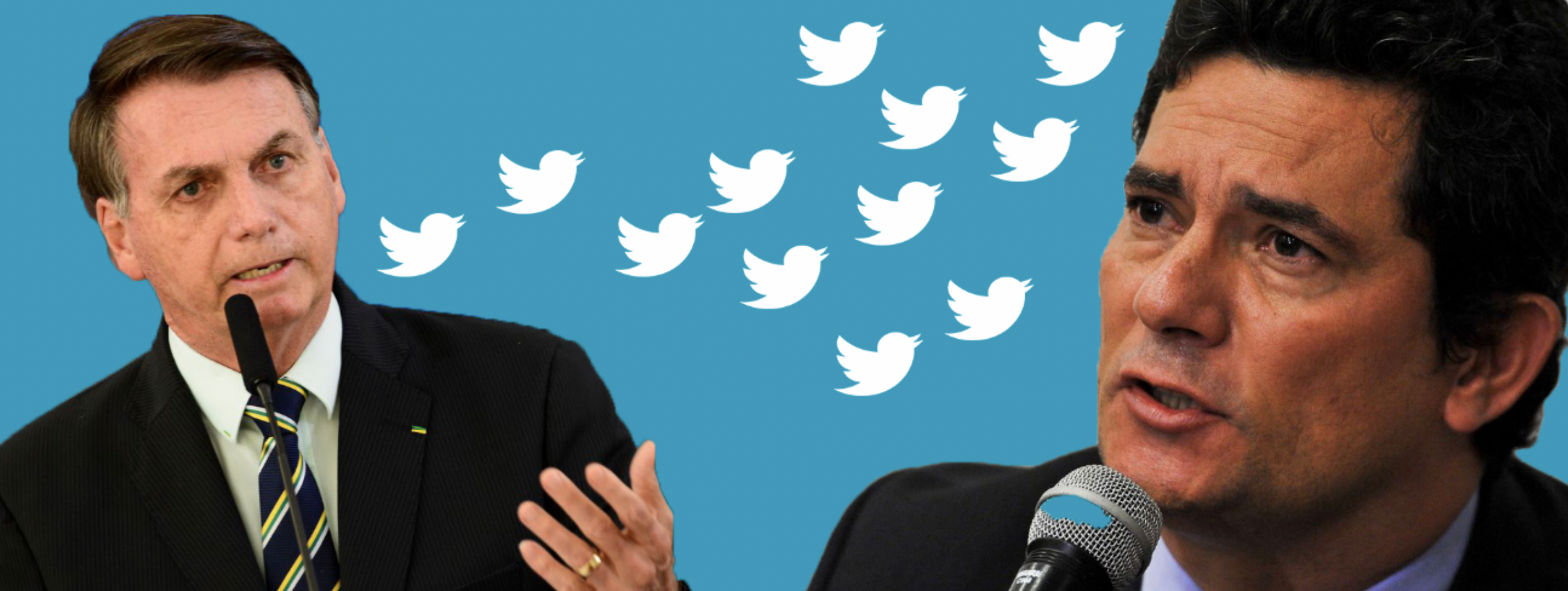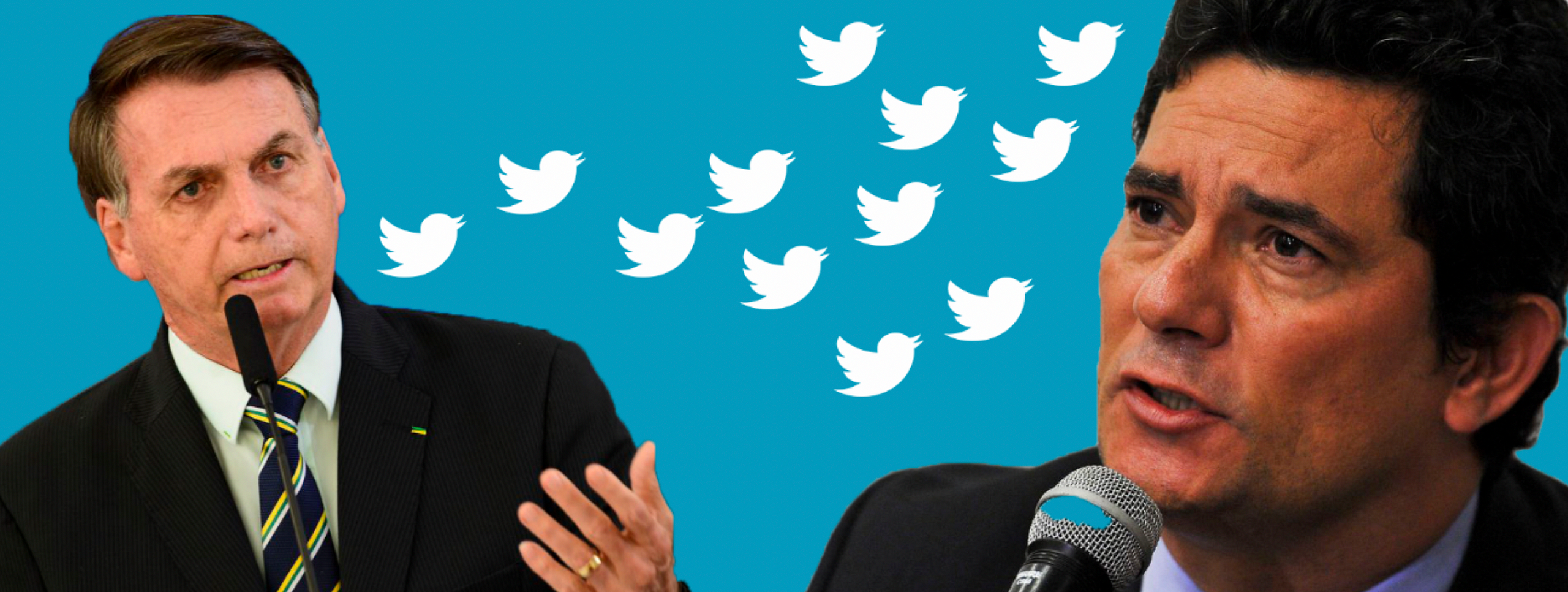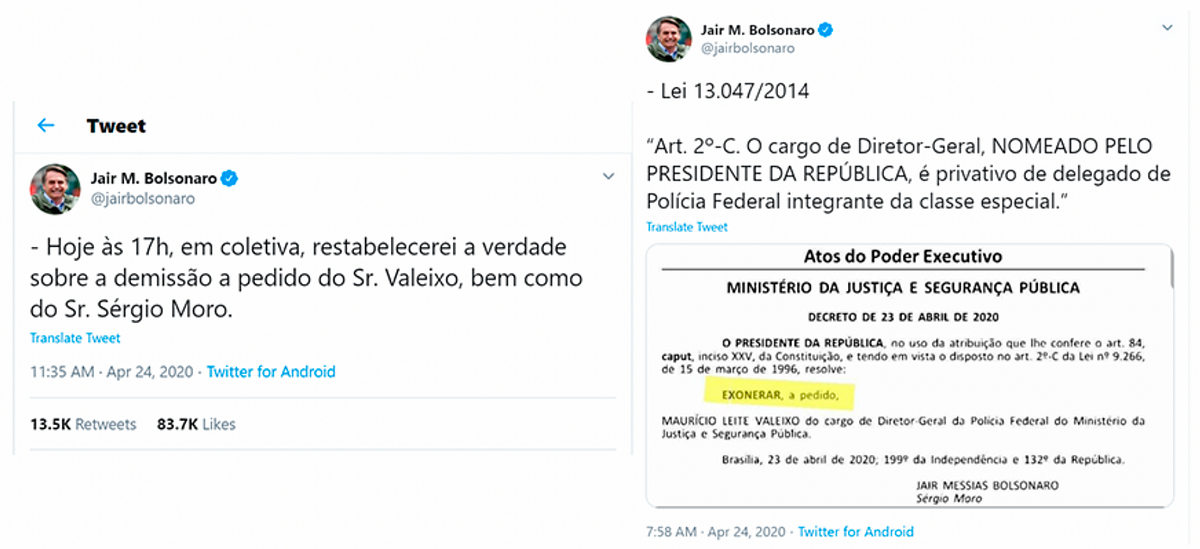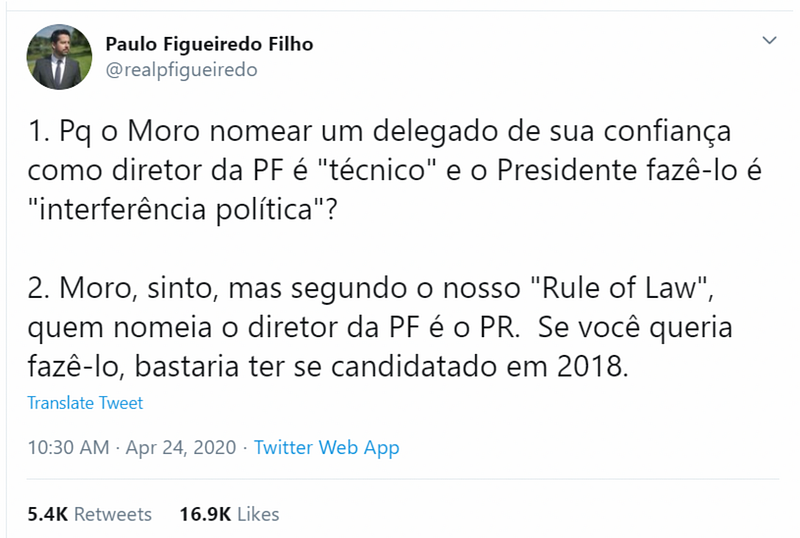Top tweets about Brazilian justice minister’s resignation suggest Bolsonaro losing support on…
Sergio Moro resigned amid claims President
Top tweets about Brazilian justice minister’s resignation suggest Bolsonaro losing support on…

Sergio Moro resigned amid claims President Bolsonaro meddled with the autonomy of Brazil’s Federal Police for political gain

Among the 50 most-retweeted posts regarding the resignation of Sergio Moro, now the former justice minister of Brazil, only three supported President Jair Bolsonaro — two of which were posted by Bolsonaro himself.
Moro resigned on April 24, 2020, after Bolsonaro made the decision to replace the head of the country’s Federal Police, Mauricio Valeixo. The former justice minister was one of the most prominent and most popular figures within the Bolsonaro government; prior to joining the government, Moro was the head of the well-known Car Wash investigation — and the public face of the fight against corruption in Brazil.
The lack of pro-Bolsonaro tweets among the most retweeted posts on Twitter suggests that Bolsonaro is losing the ability to shape the conversation on the platform, where pro-Bolsonaro tweets and hashtags once dominated. Bolsonaro’s effective use of social media is considered one of the factors that led to his election as president. There are signs, nonetheless, that Bolsonaro is losing support on social media.
Sergio Moro’s resignation has complicated Bolsonaro’s political situation. Opposition political parties have formally requested his impeachment, and former president Fernando Henrique Cardoso asked for his resignation. Meanwhile, Brazil’s Office of the Prosecutor General has requested that the Supreme Court investigate Moro’s accusation that Bolsonaro was trying to meddle with the Federal Police.
Bolsonaro was already facing pot-banging protests amid the COVID-19 pandemic. Brazilians are protesting against the president’s handling of the crisis and his attempt to downplay the pandemic. He has called the virus a “little flu” and has protested lockdown measures. As of April 24, Brazil had 52,995 COVID-19 cases and 3,670 deaths.
Reaction on Twitter
An analysis made with with the social media monitoring tool Meltwater Explore showed that of the most retweeted posts referring to Moro’s resignation published on April 24 until 6 p.m. local time, only three out of the top 50 tweets were pro-Bolsonaro.
Two of the three tweets were published by Bolsonaro himself: in one, he announced that he would “reveal the truth” in an official statement in the afternoon, and in the other, he posted a copy of the official act that dismissed the head of the Federal Police from the government. The posts were retweeted 5,500 and 13,100 times respectively. Bolsonaro has 6.5 million followers on the platform.

The other pro-Bolsonaro tweet on the top-50 list was posted by pro-Bolsonaro economist Paulo Figueiredo, who has some 24,000 followers. Among the top 50 tweets, his tweet appeared in 47th place. His post regarded Moro’s claim that Bolsonaro was interfering with the autonomy of the Federal Police by firing its chief. “Why is Moro appointing a police chief he trusts as director of the Federal Police a ‘technical decision,’ while the president doing it is “political interference?” he wrote, the implication being that if Moro wanted to decide who was going to be the director of the Federal Police, he should have run for president in 2018.

According to Moro, Bolsonaro did not present any credible reason for firing the director of the Federal Police, claiming the president wanted to appoint someone that was closer to him and that could give him reports about the findings of investigations. Bolsonaro confirmed later in his address to the nation that he wanted to be informed of police investigations, but to make government decisions rather than to protect allies. He also claimed the head of the police wanted to be dismissed.
Bolsonaro’s interest in being informed of police findings is worrisome, as the Federal Police is usually the entity tasked with investigating political crimes. It had a prominent role, for instance, in the Car Wash investigation led by Moro, which saw ranks of politicians and businessmen arrested across the country. As mentioned by Moro, former president Dilma Rousseff, who was in office at the time of the investigation, did not have access to findings.
Currently, the Federal Police is involved in the investigation of the murder of Rio de Janeiro’s city councilwoman Marielle Franco, killed in March 2018. A claim that one of the hitmen lived in Bolsonaro’s condominium, as his name was mentioned by one witness, surfaced in 2018. It was later dismissed as incorrect.
Moro also claimed that Bolsonaro said he worried about political cases going before the Supreme Court, and that changing the head of the police would be a good decision. Later, Moro presented to media an alleged WhatsApp conversation with the president in which Bolsonaro sent a link of an article about investigations conducted by the Supreme Court, adding, “One more reason to change [the police director].”
The article referred to two cases before the Supreme Court that could impact Bolsonaro’s family and close allies. The first is an investigation of the existence of a disinformation operation known as the “Hatred Cabinet.” According to former allies of the president, Bolsonaro’s sons and advisors run an information operation that targets rivals on social media.
The second investigation aims at revealing who was behind anti-democracy protests on April 19 that targeted the Supreme Court and Congress — protests that the president himself joined. According to journalists, this investigation could connect the protests to Bolsonaro’s allies.
Pro-Moro and anti-Bolsonaro tweets
Among the other highly retweeted posts, only one other came from a pro-Bolsonaro influencer. In the post, however, she supported Moro rather than Bolsonaro. The author of the tweet, former volleyball player Ana Paula Henkel, wrote, “This profile will always be team Moro.” The comment illustrates how Bolsonaro could lose part of his support by firing Moro — who has higher approval ratings than the president.

Among the other tweets in the top 50 were posts criticizing Bolsonaro; people praising Moro for saying in his speech that the Worker’s Party presidential administration did not try to meddle in Federal Police work; and posts by left-wing influencers criticizing Moro.
Sergio Moro has been the subject of some controversy in Brazil. While he led the investigation that dismantled what has been called the “biggest corruption scandal” in Brazil’s history and arrested important politicians and businessmen in the country, some believe he acted in a partisan way when leading the Car Wash probe. Moro was responsible for the decision that led to the arrest of former president Luiz Inácio Lula da Silva in April 2018 that legally removed him from running for president. Later, Moro accepted the position as justice minister, which was seen by some on the left as proof of his partisanship.

The hashtags used on Twitter until 6 pm on April 24 — the time that Bolsonaro finished his address to the nation — also showed a negative reaction. Among the five most-used hashtags were #ForaBolsonaro (“Out, Bolsonaro”), #BolsonaroTraidor (“Traitor Bolsonaro”), and #TchauQuerido (“Bye, dear”). These hashtags were mentioned 133,138 times. The pro-Bolsonaro hashtag #FechadoComBolsonaro (“Locked in with Bolsonaro”) was mentioned 34,590 times.
Support in the digital arena will be crucial for the remainder of Bolsonaro’ time in office. Brazil is expected to be hit by a hard economic crisis amid the COVID-19 pandemic, and recent events indicate an impeachment trial may be on the horizon. The loss of organic support on Twitter, along with the investigations about inorganic actions to spread his message on social media, might be a sign that Bolsonaro will have a hard time using social platforms to bolster his presidency.
Luiza Bandeira is a Research Associate, Latin America, with the Digital Forensic Research Lab.
Follow along on Twitter for more in-depth analysis from our #DigitalSherlocks.

